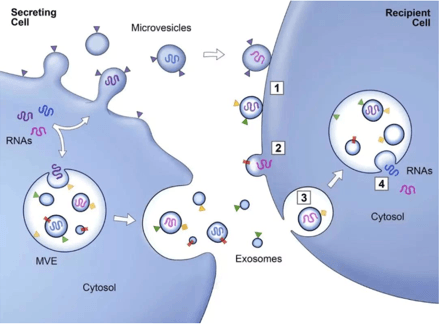Exosomes are small vesicles with a lipid bilayer membrane structure of about 50-150 nm in diameter. Exosomes can be secreted by most cells and enter various body fluids. Exosomes carry a variety of proteins, peptides, lipids, and nucleic acids (such as microRNAs, mRNAs, and long-chain non-coding RNA), which can act as cell-cell mediators to transmit important signals and affect the physiological and pathological states of cells. Based on clinical samples, Creative Proteomics analyzes and verifies miRNAs that significantly affect tumor metastasis in exosomes of clinical samples, explores the molecular mechanism of their pathogenicity, and provides preliminary data basis for the determination of targets and biomarkers for subsequent antitumor exosomal drugs.
As the study of exosomes becomes more and more in depth, researchers have found that it is widely involved in various biological processes such as the body's immune response, tumor growth and invasion. Especially in the process of tumorigenesis and development, it plays an important role in the continuous growth, invasion and metastasis of cancer cells. By analyzing and identifying clinical samples, exosomes were co-incubated with tumor cells to detect the ability of tumor cells to metastasize.
At the same time, differential miRNAs in exosomes of different samples were analyzed by expression profiling microarrays, and key functional miRNAs were verified by high-throughput cell functional screening platform HCS screening. Exosome donor tumor cells are regulated for key functional miRNAs. The isolated exosomes are used to process recipient cells to detect exosome miRNA transport, function, and molecular mechanisms, and to verify the in vivo function of this key miRNA at the animal level.
Figure 1. Exosomal formation. (Journal of Cell Biology, doi:10.1083/jcb.201211138)
Experimental Content
1. Customize your experiments, collect serum plasma samples according to your purpose, extract exosomes from serum plasma by differential high-speed centrifugation and membrane filtration, and perform WB, TEM electron microscopy, NTA particle size analysis.
2. Exosomal function analysis: select corresponding cell models and functional tests for verification analysis. Exosomes in clinical samples in Experiment 1 can be taken to treat tumor cell lines and verified by Transwell transfer experiments The effect of exosomes on the metastatic function of tumor cells; the exosomes in the clinical samples in Experiment 1 can also be taken to treat vascular endothelial cells HMEC1, and the effects of exosomes on the angiogenic capacity of vascular endothelial cells can be verified by angiogenesis experiments.
3. Exosomal content molecular analysis: Take the exosomes from Experiment 1, extract RNA, perform miRNA chips, analyze the differential miRNAs between samples, and perform miRNA analysis.
4. Use the High Content Cell Functional Research Platform (HCS) to screen key functional miRNAs in exosomal differential miRNAs and perform further functional verification on the selected miRNAs: tumor cell lines further complement Transwell invasion experiments, scratch healing, EMT Marker WB detection; vascular endothelial cells further supplement vascular permeability experiments, Transwell transfer experiments, scratch healing, MTT and other experiments.
5. Study on the role of exosomes in transporting miRNAs: Transfect the target miRNA mimics in tumor cell lines (two strains), take the cell culture supernatant and incubate the recipient cells, qPCR to detect the target miRNA expression level and function changes in the recipient cells.
6. Objective miRNA In vivo function verification: Nude mice were injected with a tail vein injection model to verify the function of the target miRNA in vivo.
7. Objective To study the mechanism of miRNA action.
Creative Proteomics leads a rich team that uses the most rigorous experimental solutions and internationally recognized experimental techniques for Research program of tumor exocrine to obtain your customized information. Use the most accurate experimental results to help you better carry out tumor-related scientific research.
Our Advantage
Mature and reliable Research program of tumor exocrine platform: rich project experience, participate in major projects, and publish high-level cooperation results.
The analysis contents and methods based on high-quality data analysis, pre-research and verification are indeed mature and feasible.
* For Research Use Only. Not for use in the treatment or diagnosis of disease.
Related Services:








